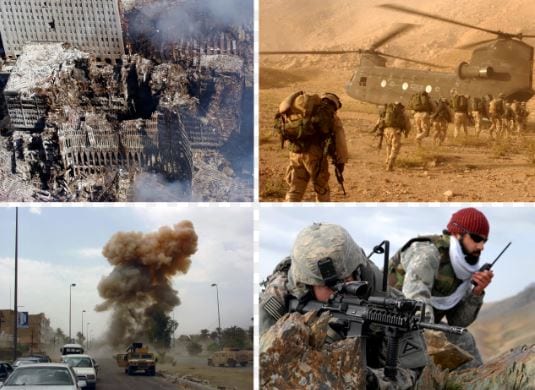
Editor: Vladimir Bajic | Tactical Investor
Wasting Billions on Homeland Security Projects
Updated Aug 2023
First, let’s get to the article of the week
Anxiety-like fear is an emotion that is totally useless when it comes to trading the markets. In fact, one could argue that they are almost the same thing. An anxious person worries about events they cannot see but they are highly capable of creating a mountain of a molehill. Fear is usually based on something tangible but anxiety is based on something that is not real. Both these emotions are destructive and should be avoided at all costs. The Anxiety Index allows the astute trader to use this data to gain an edge in the financial markets.
Sentiment Trader: Market Sentiment Helps Identify the Markets Trend
The Tactical Investor is the only financial site to maintain such an Index. It took years to develop and is based on data that we personally collect. We don’t have to rely on second-hand data that might be tainted as we control the data. We are continually fine-tuning our data collection protocols. The latest development includes an AI (artificial intelligence component) which scours the net for keywords and phrases. The phrases are then ranked and given values ranging from 0-100.
If you ever wanted to see what is going on in the mind of the average investor, then this index provides a very clear picture. The pictorial format makes the data easy to understand and implement. We are confident that it can significantly improve your trading results. Imagine knowing in advance what the crowd is thinking and or doing. This index has helped keep us on the right side of the market for years. Sentiment Trader; Never follow the Crowd
Wasting Billions on Homeland Security Projects That Don’t help
This author provides detailed info on why the billions we have spent on keeping the homeland safe has been a total waste. We have started wars for no reason by inventing excuses such as trying to promote democracy in areas, where it will not work at all. Case in point, the stupid Iraq war, which has killed thousands of innocent people and destroyed a once prosperous nation, and that has opened up a chasm of instability in the Middle East that’s spreading like a wildfire.
But for every valid effort, it seems like the terrorism-industrial complex came up with an array of boondoggles that were profitable for the companies involved but added little to the security of ordinary Americans. The upwards of $47 billion spent on FirstNet, the troubled effort to make sure firefighters and police could talk to each other in an emergency, staggers the imagination. Altogether, Brill calculates, the government has spent $100 to $150 billion on equipment and programs that do not work. What might have been accomplished if all of that money had been spent on, say, reducing the cost of a college education for poor and middle-class kids? Full Story
“Let’s delve deeper into the insights shared in the preceding article, expanding on various key points to offer a comprehensive understanding of the current situation.”
Questionable Wars and Their Consequences
The article raises concerns about the justification and outcomes of certain wars, such as the Iraq war, which the author argues were based on flimsy reasons and have resulted in the loss of innocent lives and the destabilization of regions. The Iraq war is cited as an example of wasteful military spending that has had significant negative consequences, including the destruction of a once prosperous nation and the spread of instability in the Middle East.
The discussion surrounding questionable wars highlights the need for a critical examination of the decision-making processes and justifications for military interventions. It raises questions about the allocation of resources and whether alternative approaches could have been pursued to address the underlying issues more effectively.
Profits and Inefficiencies in the Terrorism-Industrial Complex
The author criticizes the “terrorism-industrial complex” for driving wasteful spending on homeland security projects that do not effectively contribute to the security of ordinary Americans. Examples, such as the troubled FirstNet project aimed at enabling communication between emergency responders, are highlighted as examples of costly endeavors that have failed to deliver the intended results.
The focus on profits for companies involved in these projects raises concerns about the influence of vested interests and the potential for inefficient allocation of resources. The article suggests that billions of dollars have been spent on equipment and programs that do not work, indicating a need for greater scrutiny and accountability in the funding and execution of homeland security initiatives.
Missed Opportunities for Social Investments
The article highlights the staggering amount of money that has been spent on ineffective homeland security projects, estimating a total of $100 to $150 billion. It raises the question of what could have been accomplished if these funds had been allocated differently, such as investing in areas like education, specifically reducing the cost of college education for disadvantaged and middle-class students.
This discussion touches on the trade-offs and priorities in government spending. It prompts reflection on whether resources could have been directed towards initiatives that would have had a more significant and lasting impact on improving societal well-being and addressing socioeconomic inequalities.
In conclusion, the article argues that billions of dollars have been wasted on homeland security projects that have not effectively contributed to the safety of the nation. Questionable wars, the influence of the terrorism-industrial complex, and missed opportunities for social investments are identified as key issues. The discussion raises important considerations about the decision-making processes, accountability, and the allocation of resources in the realm of national security.
Other Articles of Interest
Unapproved Pharmaceutical Ingredients In Dietary Supplements
Market Update Tactical Investor Past Calls: The Trend Is Your Friend
Dow Jones Industrial Average Stocks Soar Slaughtering the Bears
Gold buying Spree Russia & Russian Strength?

China’s corruption crackdown targets both big & small officials
China Corruption: Fast & Furious crackdown
The Big Picture: Lower oil & energy prices
Crude oil price projections: will oil prices stabilize
The Middle Class Squeeze: 4.00 in 1973 equates to 22.41 today
Syria War News: It Is All About Blood, Guns & Money
For Many Americans Great Recession Never Ended
Is VIX pointing to a stock market crash in 2016?
Belt & Road Initiative: Taking China’s culture beyond borders
EU stands to benefit by Granting China free market status
China cuts rates to boost green energy demand
One chart clearly illustrates coming student loan debt crisis


